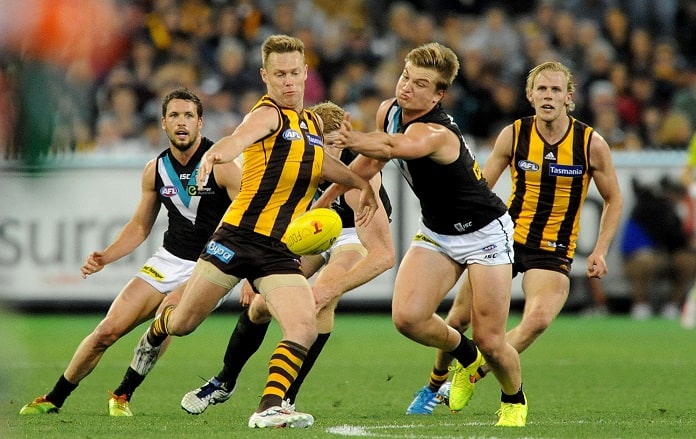All aspects of life have been disrupted by COVID-19, including entertainment—from live music, cinema and the arts to the deep-rooted popular football codes, Australian rules and rugby league.
Simultaneously, the pandemic has exposed and magnified the fault-lines of profit, power, sexism and racism in this class society. Michael Warner’s book The Boys’ Club sets out to examine the inner workings of the Australian Football League (AFL)—run as a particularly obnoxious capitalist business.
Warner’s criticisms of the Melbourne-based executive of the AFL Commission shine a light on the business model of a powerful section of the Melbourne ruling class.
As Frank Galbally, QC and former Collingwood board member, says: “If you want to do anything in Victoria, if you want to get to anybody in Victoria, the way to do it is through an AFL club.
“If you know a [club] president, you know someone in the AFL, that’s the way to get to politicians, get whatever you like. They all think it’s the greatest thing since sliced bread.
“It’s the power of Australian Rules football. And more particularly in Victoria than anywhere else.”
Behemoth
Warner, in his bid to “reform” the AFL executive’s hold, traces the roots of it becoming the unaccountable, sexist behemoth that is today.
The AFL, its predecessor—the Victorian Football League (VFL)—and the individual football clubs have always been run by businessmen, emphasis on “men”, with tight connections inside the ruling class of Melbourne.
All the people Warner interviews are part of the ruling class, although with the shift from the VFL to the AFL not all from Melbourne.
Richard Goyder, the Chair of the AFL Commission, is also head of Wesfarmers and Qantas. He lives in Peppermint Grove in Perth, which former WA Liberal Premier, Colin Barnett, once dubbed “the Monaco of WA”.
In Sydney, rugby union plays this networking role in a lesser way, as the sporting wing of the Liberal Party.
Warner shows how the AFL Commission office has a toxic culture of sexism, with many women forced to leave their dream job because of the entitled misogyny of the male bosses. This is despite having women commissioners like Linda Dessau, the Governor of Victoria.
The book details the splits and cracks inside the ruling class, especially over the AFL executive’s high-handed and sexist workplace behaviour and how it deals with crises such as player drug-use, racism and betting. The AFL garners 8 per cent of its revenue from betting.
But while Warner understands the AFL is a successful business, highlights the bad practices of that business model and acknowledges its pulling power, he doesn’t explain why this sport has such traction inside the working class.
There are 613,000 members of the 10 AFL clubs in Victoria, almost 1 in 9 residents of the state. Workers follow and play football but it is not “a working class game”.
The AFL recognises its first direct predecessor game as taking place in July 1858 between two elite schools, Melbourne Grammar and Scotch College.
Like rugby, one of Australian rules’ predecessor codes, this new sport was a product of English private schools, which idolised “manliness” as a prerequisite for the running of a colonial empire.
Candid
Upper-class schools divided their students into “houses”, which became competing tribes. The ruling class used this as a template for dividing and ruling society at large.
Warner interviews the “Who’s Who” of the ruling class of Melbourne, including former Liberal Premier Jeff Kennett, former president of the Hawthorn Football Club. Kennett is candid about the role AFL plays.
“For so many people, after their family and place of employment, AFL football gives them the opportunity to vent their spleen in support or opposition … It is, for so many people, the pressure cooker valve.”
People watch sport because of the alienation of work under capitalism. It is an escape from drudgery—but even here the bosses aim to commodify workers’ leisure time. As Gillon McLachlan, CEO of the AFL and a scion of the South Australian McLachlan family, said: “For me, the vision is about having an unassailable hold on the Australian community.”
Another component part of the AFL’s appeal is nationalism. Here is apparently the “Australian game” unlike the imported rugby league or soccer.
The Russian revolutionary Leon Trotsky wrote in the mid-1930s: “In the sphere of philanthropy, amusements and sports, the bourgeoisie and the church are incomparably stronger than we are. We cannot tear the working class youth from them except by means of the socialist programme and revolutionary action.”
When the system is being fought by workers then sport will play a less important part in their lives.
By Tom Orsag
The Boys’ Club: Power Politics and the AFL by Michael Warner
Hachette Australia, $32.99






